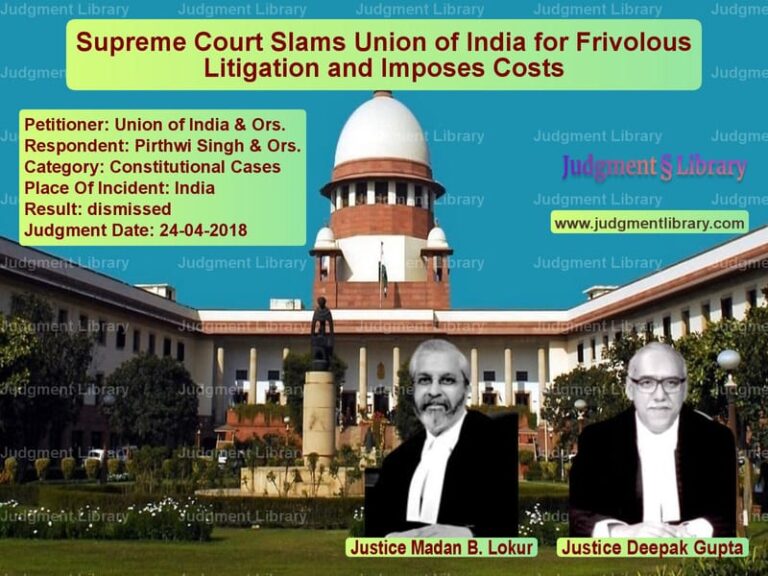Power Purchase Agreement Dispute: Supreme Court’s Final Verdict Explained
The Supreme Court of India has delivered an important ruling in the dispute between Mangalore Electricity Supply Company Limited (MESCOM) and M/s. AMR Power Private Limited regarding the termination of a Power Purchase Agreement (PPA) and the right to open access for electricity supply. This case, centered on contractual obligations, financial defaults, and regulatory compliance, holds significant implications for power sector agreements in India.
Background of the Case
Mangalore Electricity Supply Company Ltd. (MESCOM), a power distribution licensee, and AMR Power Private Limited, a renewable power generator, signed a Power Purchase Agreement (PPA) on August 2, 2006. The agreement involved the supply of 24 MW of electricity from AMR Power’s mini hydel power project in Karnataka.
The PPA specified that for the first 10 years, MESCOM would pay Rs. 2.80 per kilowatt-hour, with rates for the subsequent years to be determined by the Karnataka Electricity Regulatory Commission (KERC). The agreement had a term of 20 years, with the possibility of renewal for another 10 years.
On August 4, 2008, AMR Power increased its plant’s capacity from 24 MW to 24.75 MW. The company began supplying electricity to MESCOM on September 12, 2009.
Emergence of the Dispute
AMR Power filed O.P. No. 28 of 2009 before the Karnataka Electricity Regulatory Commission (KERC), seeking a declaration that the PPA was null and void, along with a request for open access. KERC initially directed MESCOM to synchronize the plant and pay Rs. 2.80 per unit, pending final adjudication.
However, KERC dismissed the petition on December 23, 2010. AMR Power subsequently requested a revision of the tariff, which MESCOM denied. A review petition was also dismissed in 2011.
Issuance of the Default Notice and Termination
On May 26, 2011, AMR Power served a Default Notice to MESCOM under Article 9.3.2 of the PPA, citing:
- Default in payment of power bills
- Non-payment of interest on delayed payments
- Failure to open a Letter of Credit
MESCOM responded on July 4, 2011, stating that it was trying to clear pending payments and that delays were due to procedural issues. However, AMR Power was unsatisfied and issued a Notice of Termination of the PPA on July 22, 2011.
Legal Battles and High Court Proceedings
AMR Power filed O.P. No. 48 of 2011 before KERC, seeking a declaration that the PPA had been terminated and requesting open access. KERC ordered interim payments at Rs. 2.80 per unit but later dismissed the petition after AMR Power withdrew it.
Subsequently, MESCOM filed O.P. No. 37 of 2012 before KERC, seeking to quash the termination notice and declare the PPA valid. AMR Power also approached the Central Electricity Regulatory Commission (CERC) for interstate open access.
KERC directed status quo on the matter, leading to an appeal before the Appellate Tribunal for Electricity (APTEL), which clarified that the status quo did not imply a stay on the PPA’s termination.
On August 14, 2013, KERC upheld the termination notice. MESCOM’s appeal to APTEL was dismissed on October 17, 2014.
Arguments Presented Before the Supreme Court
In the Supreme Court, MESCOM, represented by Senior Counsel Mr. V. Giri, argued that:
- AMR Power had repeatedly attempted to escape its obligations under the PPA.
- The company first sought to declare the PPA void and, after failing, used payment delays as an excuse to terminate the contract.
- Withdrawal of O.P. No. 48 of 2011 barred AMR Power from raising similar issues in O.P. No. 37 of 2012 under Order 23, Rule 1 of the Civil Procedure Code.
AMR Power, represented by Senior Counsel Mr. Basava Prabhu S. Patil, countered that:
- MESCOM had admitted delays in payments and failed to open a Letter of Credit.
- The agreement required payments within a specific time, and MESCOM had defaulted on these obligations.
- Withdrawal of O.P. No. 48 of 2011 did not prevent AMR Power from raising defenses in other litigation.
Key Supreme Court Observations
The Supreme Court examined the provisions of the PPA and found that MESCOM had defaulted on multiple grounds. The Court noted:
“In view of the default mentioned by the First Respondent in the notice not being remedied within a period of 30 days, we are of the opinion that the Second Respondent Commission and the APTEL were correct in upholding the termination notice.”
The Court also rejected MESCOM’s argument that the delay was justified due to inter-connection approvals, stating:
“The grant of inter-connection approval on 26.03.2011 could not be a justification for delayed payment of bills.”
On MESCOM’s argument that continuing power supply after termination condoned past defaults, the Court ruled:
“The continuation of supply after the Termination Notice dated 22.07.2011 cannot be taken to be a condonation of the events of default.”
Final Judgment
The Supreme Court upheld the APTEL and KERC rulings, dismissing MESCOM’s appeal. It ruled that the PPA had been validly terminated, and MESCOM could not force AMR Power to continue supplying power under the agreement.
The judgment clarified that power purchase agreements must be strictly adhered to, and financial defaults could not be overlooked. This ruling strengthens contractual enforcement in the energy sector and provides guidance for similar disputes.
Implications of the Judgment
The ruling underscores key principles in energy contracts:
- Power Purchase Agreements are binding, and financial defaults can lead to termination.
- Regulatory commissions play a crucial role in enforcing contract terms.
- Withdrawal of a legal petition does not necessarily bar defenses in future litigation.
Conclusion
This judgment provides clarity on the enforcement of PPAs, ensuring accountability in energy transactions. It emphasizes the importance of adhering to financial obligations in power contracts and sets a precedent for future regulatory disputes in the energy sector.
Don’t miss out on the full details! Download the complete judgment in PDF format below and gain valuable insights instantly!
Download Judgment: Mangalore Electricit vs MS. AMR Power Priva Supreme Court of India Judgment Dated 15-09-2016-1741883774465.pdf
Direct Downlaod Judgment: Direct downlaod this Judgment
See all petitions in Contract Disputes
See all petitions in Corporate Governance
See all petitions in Judgment by Anil R. Dave
See all petitions in Judgment by L. Nageswara Rao
See all petitions in dismissed
See all petitions in supreme court of India judgments September 2016
See all petitions in 2016 judgments
See all posts in Corporate and Commercial Cases Category
See all allowed petitions in Corporate and Commercial Cases Category
See all Dismissed petitions in Corporate and Commercial Cases Category
See all partially allowed petitions in Corporate and Commercial Cases Category







